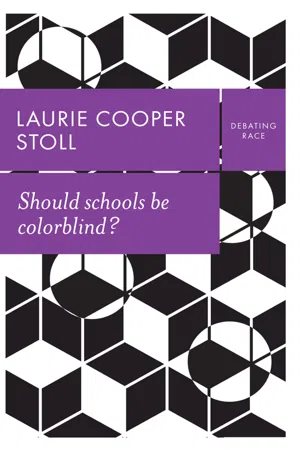
- English
- ePUB (mobile friendly)
- Available on iOS & Android
Should schools be colorblind?
About this book
Is being colorblind the most effective way to address overt and covert racism in schooling today? Should educators pretend that race doesn't matter?
Award-winning sociologist Laurie Cooper Stoll argues that, as long as society is stratified along racial lines, taking a colorblind approach will never end racial inequalities in schooling. Educators must strive to be color-conscious and actively engage in antiracism if they want to address prejudice and discrimination in education and the wider society. If not, they end up perpetuating racial inequity and white supremacy, whether intentionally or not.
Drawing on her research and professional development with educators as well as her experience as a publicly elected school board member, Stoll illustrates the complexities, contradictions, and consequences of colorblindness in schools and provides concrete suggestions for people coming to racial justice work in education from multiple entry points.
Frequently asked questions
- Essential is ideal for learners and professionals who enjoy exploring a wide range of subjects. Access the Essential Library with 800,000+ trusted titles and best-sellers across business, personal growth, and the humanities. Includes unlimited reading time and Standard Read Aloud voice.
- Complete: Perfect for advanced learners and researchers needing full, unrestricted access. Unlock 1.4M+ books across hundreds of subjects, including academic and specialized titles. The Complete Plan also includes advanced features like Premium Read Aloud and Research Assistant.
Please note we cannot support devices running on iOS 13 and Android 7 or earlier. Learn more about using the app.
Information
Index
- ACC (African-Centered Curriculum)
- aims and goals 35–6
- multiculturalism 39–41
- teachers’ attitudes 36–7, 38–40
- accommodation/transformation 25
- administrators
- advocacy role 82–9
- antiracism 87–8
- as ex-teachers 83
- personal/professional development 77, 83–4, 89
- racial justice 82–9
- self-reflection 88–9
- social inequalities perspectives 83
- and teachers 22, 23, 79
- advocacy role
- administrators 82–9
- community members 95–8
- school board members 89–95
- for social justice 101–2
- teachers 66, 71–82, 101, 104
- African Americans 36–7, 45, 78
- see also black community; black students; students of color
- African-Centered Curriculum: s...
Table of contents
- Cover
- Table of Contents
- Preface
- ONE: Race and colorblindness in schools today
- TWO: Now you see race, now you don't
- THREE: Doing antiracism in schools
- Postscript: Social justice canaries in the coalmine
- References
- Index
- End User License Agreement